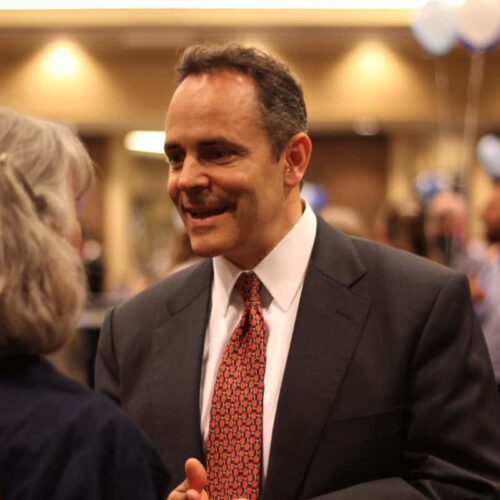This story is part of a collaboration between the Center for Public Integrity, Ohio Valley ReSource and the Kentucky Center for Investigative Reporting.
Introduction
In 2007, a small bell-making company in East Hampton, Connecticut was inspected by the federal Occupational Safety and Health Administration (OSHA) after a workplace injury. The company was cited for serious noise exposure, failure to provide protective eye equipment and other violations.
The company’s manager, Doug Dilla, didn’t take well to being inspected, according to the report. Dilla “stated he would close his doors. [Dilla] does not like OSHA and made it clear.”
The report said the manager did not seem to want to improve worker safety at the company.
The next time OSHA showed up was in 2011. An anonymous complaint alleged numerous worker safety violations at the factory, and OSHA opened an investigation as part of a national program aimed at minimizing amputation risks.
Dilla was still manager, but by then, the company’s ownership had changed. Now, Bevin Brothers Bells was owned by Matt Bevin.
An investigation revealed that the company had several serious worker safety violations, including a lack of training and safety programs. As the complaint alleged, the power presses were indeed inadequately guarded. Federal OSHA issued a $25,000 fine, later reduced through a settlement to $12,600.
Bevin Brothers Bells’ history with OSHA was reported by Buzzfeed during Bevin’s run for Kentucky governor in 2015. At the time, he dismissed it as a non-story, and said the penalty was a money grab by OSHA. The reduced fine the agency ultimately issued was too small to mean anything, he said.

“They didn’t find anything that was actually a compromising of safety,” Bevin told a reporter from CN2. “It was all administrative stuff.”
The Republican and millionaire businessman would soon be responsible for appointing the secretary of the state Labor Cabinet in Kentucky, a state which runs its own Occupational Safety and Health agency.
While his Democratic predecessor appointed union leaders to the role of Labor secretary throughout his tenure, Bevin’s two appointees have been a former University of Kentucky and NFL football star and the owner of a sawmill.
Bevin declined numerous requests for interviews from KyCIR. But the governor, who ran on a platform of deregulation, told a reporter in 2015 that federal OSHA was “an unfortunate nuisance for many companies.”
“That’s sadly the cost of doing business in America — one of the costs I talk about when I talk about over-regulation,” said Bevin.
In his first three years in office, Bevin has put in motion his signature initiative, “cutting the red tape,” by rolling back many regulations that he says restrict businesses. This is the political backdrop as Kentucky’s Occupational Safety and Health agency has come under fire for failing to properly investigate worksites after an employee dies on the job.
Bevin’s pro-business agenda has taken off in the first few years of his governorship, supported by Kentucky’s first Republican-majority statehouse in nearly 100 years.
In the early days of the 2017 legislative session, Kentucky passed right-to-work, which allows workers to not pay union dues even if they work at a unionized company; eliminated the prevailing wage, which had created a minimum hourly rate for public works jobs; and created a sunset provision so all administrative regulations expire after seven years.
The 2018 session continued that trend with a reworking of the state’s workers compensation system that that shortened the amount of time some injured workers can receive benefits, among other changes. That bill also contained limitations on benefits for coal miners affected by black lung disease.
“We’re in an economy where these businesses are in business to make money, and maximize profits,” said Bill Londrigan, president of the Kentucky AFL-CIO. “You do that by cutting corners, putting people in unsafe conditions, not complying with the regulations — and claiming that they’re overly burdensome.”
“We’re in an economy where these businesses are in business to make money, and maximize profits. You do that by cutting corners, putting people in unsafe conditions, not complying with the regulations — and claiming that they’re overly burdensome.”
Bill Londrigan, president of the Kentucky AFL-CIO
State leaders say deregulation is intended to encourage a pro-business environment. Ashli Watts, a spokesperson for the Kentucky Chamber of Commerce, said pro-business efforts are good for all Kentuckians.
“We’ve have looked at a lot of red tape, things that have gotten in the way of businesses thriving, things that are unnecessary or burdensome,” Watts said. “But the Chamber has not advocated for anything that would lead to any kind of rolling back of regulation of anything that might hurt worker safety.”
But experts say the combination of pro-business and anti-union changes can have dangerous implications for worker safety.
“As those regulations get cut back, then workers after left without protection and if they are also in a non-union place, then they don’t even have the protection of a union,” said Laura Stock, director of the Labor Occupational Health Program at University of California at Berkeley. “All of these are contributing to the increased vulnerability of workers on the job.”
KY OSH Problems Are News To Lawmakers
Kentucky Occupational Safety and Health program (KY OSH) is facing the possibility of federal intervention for its handling of on-the-job fatalities. A federal audit issued in August found that KY OSH missed critical steps in nearly every single worker fatality investigation during a two-year period.
But this topic hasn’t been raised publicly by the governor’s office or any of the lawmakers charged with keeping a close eye on labor. Seven lawmakers from the House and Senate committees that handle labor issues, when interviewed by KyCIR in October, said they didn’t know about either the problems or that federal audit.
Sen. Alice Forgy Kerr, a Republican from Lexington, chairs the Senate Economic Development, Tourism and Labor committee. She said it’s hard to fix a problem legislators don’t know about.
“First, we would need to hear about it more,” she said after a recent committee meeting. “We would probably need … to bring some folks to the committee and get some questions answered.”
She said the next step would be legislative action, though she didn’t say what that action might look like.
Senate President Pro Tempore Jimmy Higdon, a Republican from Lebanon who sits on the Senate committee, said he hadn’t heard “anything negative” about Kentucky’s occupational safety and health agency.
“So my assumption is it’s being run the right way,” he said.
Higdon was not aware that the state’s worker safety program has been asked to create a “corrective action plan” by federal OSHA.
“I’ve seen them in the past be overzealous or punitive to business and industry, but they have a place, and they’re very important,” said Higdon. “We want to make sure all of our employees have a safe work environment.”
For some Democrats on the committee, the state of Kentucky’s worker safety agency represents an example of a larger trend.
“We certainly have seen, in my opinion, a roll-back on protections for workers in terms of wages, in terms of right to collective bargain and it seems, the right to work in a safe environment,” said Rep. Joni Jenkins, a Democrat from Shively who serves on the House Economic and Workforce Investment committee. “That’s very concerning.”
Bevin Eliminates A Board
At KY OSH itself, Bevin has cut some perceived red tape by eliminating a board of experts responsible for approving and modifying worker safety regulations.
In July, Bevin issued an executive order that abolished the OSH Standards Board and transferred the associated powers to the labor secretary.
Previously, the OSH Standards Board had 12 members representing a mix of safety and health, labor, management and agriculture, and was chaired by the labor secretary. The board was responsible for adopting or modifying workplace safety regulations, generally in response to federal regulation changes.
Since Kentucky’s safety regulations must be “as effective as” federal OSHA’s, the board’s main responsibility was to adopt, modify or suspend regulations in response to federal OSHA issuing a change.
Attorney General Andy Beshear, a frequent adversary of Bevin, immediately called for the reinstatement of the board. Senate Democrats echoed that call, writing in a letter to Bevin that the members of the board “are the men and women who are most knowledgeable of the safety and health needs of the workers of the Commonwealth.”

(Photo by J. Tyler Franklin)
In response to these criticisms, acting Labor Secretary David Dickerson responded with a harshly-worded letter. He refers multiple times to “Candidate Beshear,” a reference to Beshear’s intent to run for governor; alleged that Beshear wanted to keep the board in place for cronyism; and called the pushback one of the “outrages du jour.”
“[U]nder the logic set forth in your letters, and the logic proclaimed by Candidate Beshear, the only way to keep the sky from falling in these critical areas is to create multi-member boards that can pool the alleged ‘expertise’ of its members,” he wrote.
Dickerson declined to reinstate the board.
Donna Ringo, an industrial hygienist who represented safety and health on the board, said she heard the news from a national advocacy organization.
Most of the time, she said, the board just accepted the change as suggested by federal OSHA. But there would often be a discussion about the impact on businesses or what enforcement from KY OSH might look like. She thought the diversity of inputs was essential.
“You need people who have seen all the different issues in action,” she said. “No labor secretary can have seen all the things we have seen from all the different parts of business and labor.”
Ringo said the board typically met once a year, but had been gearing up for a more robust period of work since the passage of the sunset provision last year. All regulations passed before 2012 will have to be reconsidered, including federal OSHA standards that the board had adopted.
Now, that will all fall to Dickerson, the acting secretary.
In his letter, Dickerson said that the state confirmed with the federal Department of Labor that it would not violate the state plan by abolishing the standards board.
But experts say now is the time to make it clear there is no disinvestment in worker safety in Kentucky.
“The state is now on notice,” said Jordan Barab, former Deputy Assistant Secretary of Labor for Occupational Safety and Health under President Barack Obama. “If the state is resisting working with OSHA cooperatively, then that’s a serious problem that OSHA has to deal with.”
Eleanor Klibanoff is a reporter with the Kentucky Center for Investigative Reporting, a nonprofit investigative newsroom at 89.3 WFPL News in Louisville, Kentucky.
Ryland Barton contributed to this story. Eleanor Klibanoff can be reached at eklibanoff@kycir.org and (502) 814.6544.





Join the conversation
Show Comments